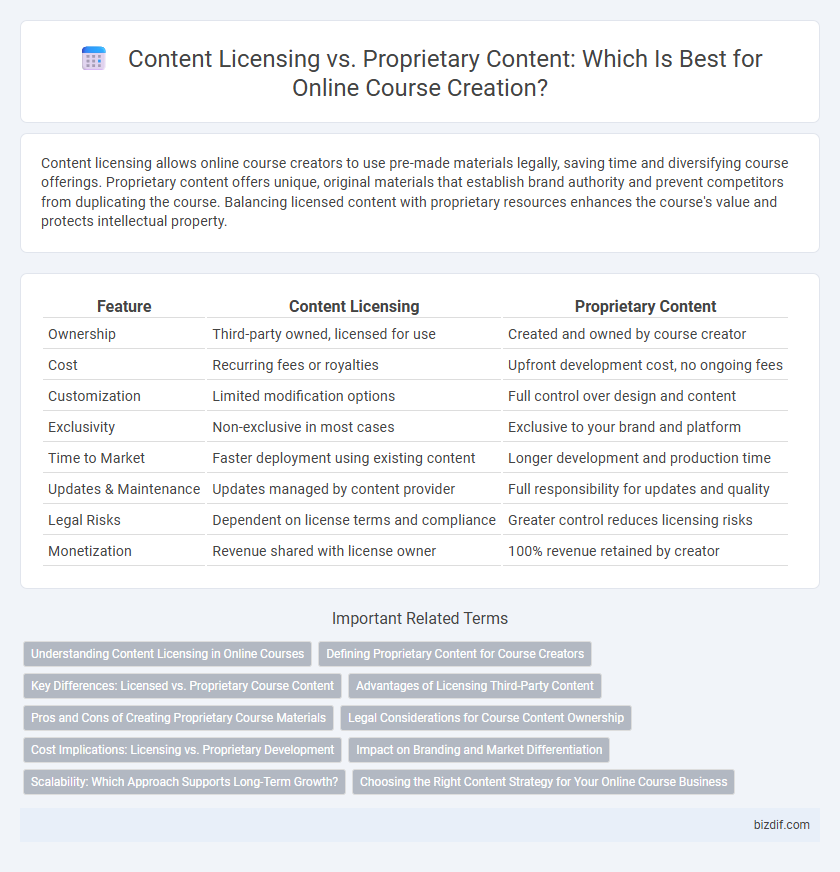Content licensing allows online course creators to use pre-made materials legally, saving time and diversifying course offerings. Proprietary content offers unique, original materials that establish brand authority and prevent competitors from duplicating the course. Balancing licensed content with proprietary resources enhances the course's value and protects intellectual property.
Table of Comparison
| Feature | Content Licensing | Proprietary Content |
|---|---|---|
| Ownership | Third-party owned, licensed for use | Created and owned by course creator |
| Cost | Recurring fees or royalties | Upfront development cost, no ongoing fees |
| Customization | Limited modification options | Full control over design and content |
| Exclusivity | Non-exclusive in most cases | Exclusive to your brand and platform |
| Time to Market | Faster deployment using existing content | Longer development and production time |
| Updates & Maintenance | Updates managed by content provider | Full responsibility for updates and quality |
| Legal Risks | Dependent on license terms and compliance | Greater control reduces licensing risks |
| Monetization | Revenue shared with license owner | 100% revenue retained by creator |
Understanding Content Licensing in Online Courses
Content licensing in online courses grants creators the legal permission to use, share, or modify educational materials under specific terms, ensuring compliance with intellectual property laws. Unlike proprietary content, which is owned exclusively by the course creator and cannot be reused or distributed without permission, licensed content offers flexibility for collaboration and resource sharing. Understanding the differences helps online educators select appropriate resources, maintain originality, and avoid copyright infringement.
Defining Proprietary Content for Course Creators
Proprietary content for course creators refers to original materials owned exclusively by the creator or their organization, granting full control over distribution, modification, and monetization. This content typically includes unique videos, lesson plans, quizzes, and multimedia assets specifically developed for a course. Defining proprietary content ensures creators protect their intellectual property and leverage exclusive rights to maximize revenue and brand authority.
Key Differences: Licensed vs. Proprietary Course Content
Licensed course content involves the use of materials created by third parties under specific permissions or agreements, enabling educators to legally access and distribute copyrighted works. Proprietary content is original material developed exclusively by the course creator, granting full ownership and control over its use, distribution, and modification. Key differences include legal rights, flexibility in content customization, and potential revenue models based on ownership status.
Advantages of Licensing Third-Party Content
Licensing third-party content allows online course creators to access high-quality, professionally produced materials without the time and expense of creating everything from scratch. It enables rapid course development, broadens the range of topics offered, and ensures legal compliance with intellectual property laws. Utilizing licensed content also enhances credibility and learner engagement by incorporating expert knowledge and diverse perspectives.
Pros and Cons of Creating Proprietary Course Materials
Creating proprietary course materials offers full control over content quality, branding, and monetization, ensuring unique and tailored learning experiences. However, developing proprietary content requires significant time, expertise, and financial investment, with ongoing updates necessary to maintain relevance. Unlike licensed content, proprietary materials avoid royalty fees and legal restrictions but demand greater responsibility for copyright protection and technical support.
Legal Considerations for Course Content Ownership
Content licensing allows course creators to legally use third-party materials under specified terms, ensuring compliance with copyright laws and reducing infringement risks. Proprietary content grants full ownership and exclusive rights to the creator, enabling greater control over distribution and monetization of course materials. Clear contracts and licenses are essential to define rights, usage limitations, and liabilities to protect intellectual property and avoid legal disputes in online course creation.
Cost Implications: Licensing vs. Proprietary Development
Content licensing for online courses often involves upfront fees and ongoing royalties, which can vary widely depending on the licensor's terms and the content's popularity. Proprietary content development requires significant initial investment in research, scripting, and media production but eliminates recurring licensing costs and provides greater control over intellectual property. Over time, proprietary content can offer cost advantages by enhancing brand value and enabling tailored updates without third-party restrictions.
Impact on Branding and Market Differentiation
Content licensing offers access to established materials that can enhance credibility but may limit unique brand identity and reduce market differentiation. Proprietary content allows course creators to develop exclusive materials tailored to their audience, strengthening brand recognition and providing a competitive edge. Investing in proprietary content fosters long-term brand loyalty and distinct positioning within the online education market.
Scalability: Which Approach Supports Long-Term Growth?
Content licensing offers scalable opportunities by allowing course creators to access a wide range of pre-existing materials without heavy development costs, enabling rapid expansion. Proprietary content requires significant upfront investment but fosters unique branding and control, which can drive sustainable growth and long-term competitive advantage. Choosing licensing accelerates growth through variety and speed, while proprietary content supports scalability by building exclusivity and customer loyalty over time.
Choosing the Right Content Strategy for Your Online Course Business
Content licensing offers access to pre-made materials with legal permissions, reducing creation time and cost for online course creators. Proprietary content, developed exclusively, enhances brand uniqueness and control but requires more investment in time and resources. Evaluating your business goals, audience needs, and available resources helps determine whether licensed or proprietary content optimally supports your online course strategy.
Content licensing vs Proprietary content Infographic

 bizdif.com
bizdif.com